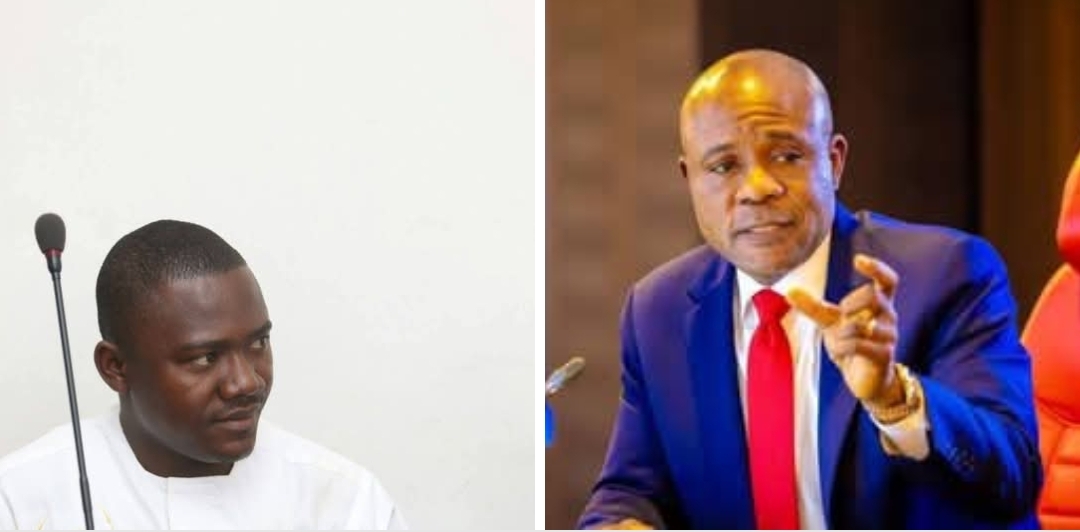Distortion of Abuja ‘Master-plan’ Driven By Greed, Politics – Iyortyer
A former staff of the Federal Capital Development Agency (FCDA), sexagenarian Arc. (Dr.) Philip Zegetar Iyortyer tells LEADERSHIP Scorecard about his experience in drawing up plans for the young city and, ultimately, about that famous ‘master-plan’.
 As a civil servant who retired from the FCDA, can you give us an insight into the agency you knew and the one which obtains today?
As a civil servant who retired from the FCDA, can you give us an insight into the agency you knew and the one which obtains today?
You know the Abuja I met as a civil servant in the FCDA was virgin land. You know, it was created in 1976 by the administration of late Head of State, Maj. Gen. Murtala Mohammed. Abuja was a jungle and, then, Suleja was part of it. You know, the government was trying to locate Abuja at the centre of Nigeria and. Truly, if you measure from Maiduguri to Abuja, Lagos to Abuja or Port Harcourt to Abuja, you will see that Abuja is located around the centre of Nigeria.
At that time, most of us working as civil servants rendered a lot of sacrifice. We were working from a field-base in Suleja, about 60kilometres from Abuja. Workers then came to work in Abuja from Suleja every day. At this time, the first major road that was constructed in Abuja was the Garki Festival Road by a French company, Dumez, which was the first construction company that started road construction in Abuja long before Julius Berger came. It was quite challenging for them to construct roads through what was considered a jungle; there were no buildings anywhere in Abuja, except a small settlement found somewhere around Maitama in 1980. People started living in Abuja from 1982.
However, when Shehu Shagari came to power between 1979 and 1983, he wanted to hasten the developent in Abuja that started in 1980, so much so that he hosted the 1982 Independence Anniversary in Abuja and, that time, we built temporary ministerial quarters at Wuse.
Shagari wanted to make Abuja City ready at all cost for the relocation of the Federal Capital Territory. Sadly, it was not possible, given that he had just four years in power. Everywhere was construction, construction of this and that just to make Abuja ready at all cost, but it couldn’t work.
It took four years for the Abuja ‘Master-plan’ to be ready. We had what was called the ‘pre-contract’ design stage. You must first get the brief. The Abuja ‘Master-plan’ was done by International Planning Associates (IPA), an American company and it took them four years to design the ‘master-plan’ of Abuja.
The Abuja you met is it quite different from the Abuja we have today?
Obviously, the Abuja of today is far from what we met at that time. I am one of the aborigines of Abuja; we are the pioneers of Abuja because we met virtually nothing on ground, we started Abuja from the scratch.
You talk of the ‘master-plan’; at what point was it distorted?
By 1983, when Shagari was over thrown, the government had given out virtually all the phase one-plots. There National Committee on Allocation of Lands was in place and land parcels were equitably distributed nation-wide, every state had a representation and lands were justly distributed according to states.
Shagari left and new government came in and, each time a new government came, it came with a different policy. During Buhari’s tenure, which was short-lived anyway, after 18 months it was a period of taking stock of what was allocated during the Shagari era, because many contracts were awarded without implementation, contracts were given but not based on competence. So, people were not contractors got contracts and sold them just to make gain, not minding whether the contracts were executed or not. Others made away with the funds for mobilisation.
When Babangida came in and stayed from 1985 to 1993, that was the peak of development of Abuja; from the Presidential Villa, Federal Secretariat, ministries, major roads in Abuja etc. In fact, it was Babangida that made movement to Abuja feasible. Nobody else can lay claim to that. He continued with the development and, even, got into phase two. Festival Road, the Apo Legislative Quarters (which I designed), are some of them.
After Babangida’s regime, there were no more land parcels to give out in phase one and politicians needed land in the heart of the city, where there were no more ‘service’ lands, but, in order to please the powers that be, they started carving out personal plots from those meant for basic amenities like hospitals, schools and other communal facilities like ‘green’ areas etc, just to please politicians. This was how the distortion came about.
A place like Ministers’ Hill was designated to be a ‘green’ area, but it was sold to politicians. Most of the leveled hills in Maitama today were part of ‘green’ areas, but were sold off as residential plots, to please people.
As of the time we started Abuja, infrastructural development was kept at a pace, people were given plots to build according to the ‘Master-plan’, but, as I speak to you now, to me, the Abuja ‘Master-plan’ has been grossly tempered and totally distorted, as a result of the influence of powers that be. Take, for instance, if a new minister comes in and needs land to be allocated to his friends and godfathers, he calls the attention of the director of planning to carve out lands from the already exhausted areas and, if the director insists on the ‘master plan’, he could be fired by the minister and a new director appointed to do his bidding. So, this abuse continues from minister to minister.
Considering that you retired in 1994, you were quite young then. Did something happen?
Instead of developing Abuja in phases as we started, they now jumped from one place to another, carving out plots from ‘green’ areas, just to please some special interests. I retired in 1994 as a director at the prime of my profession, not because I could not perform, but, because the new minister, Hamza Abdullahi, could not control me. During meetings, I tried to draw the line between what my profession could take and what was obtainable, but I was termed ‘stubborn’.
You see, whatever people may say about General Ibrahim Babangida (Rtd), he was the best, as far as developing the FCT was concerned. He brought in the best brains and professionals to achieve the plan for FCT to a great degree.
So, the distortion of Abuja ‘Master-plan’ was politically motivated, driven by greed and corruption. Many government institutions lands were revoked and re-allocated to the powers that be.
Governments come to power and friends of that government want to own land parcels in the city centre, because no one wants a plot in the jungle where Abuja started. Land racketeering led us to where we are today.
What is your impression of former minister of FCT, el-Rufai’s claim that he was trying to fix the ‘master-plan’?
Well, I was out of the civil service during the time of el-Rufai, but, to be candid, he did well. He tried to clean-up the mess in the FCT. Take, for instance, the concept of corner shops. They were not meant to be permanent, but allowed, because there were no shopping complexes or shopping malls in Abuja at the time and the government had no plan for them. Those demolitions carried out by el-Rufai were right. If he had not done that, all temporal and illegal structures in Nigeria today would have become permanent. Look at the Nyanya Labour Camp which was not meant to be, but became a ‘permanent’ feature – even though it was built for junior staff and construction companies working in Abuja. Jabi and Life Camp were meant for senior staff of the FCDA, where we stayed immediately we moved out of Suleja.
…and the compensation exercise for evictees from the FCT, so far?
Honestly, I am not an expert in the area of compensation arrangement, but, all I know [is that] in the past, attempts were made to relocate natives (the Gbagyis and others) to Kubwa, according to the relocation policy in FCT – it was strictly for the native occupants. We noticed, though, that, after relocating some of these people, they sold off the houses and moved into other rural areas to establish more illegal structures, as they awaited fresh compensation. That does not mean that Abuja is No Man’s Land.
Politically, Abuja was to have a mayor, but because politicians wanted to pocket the city as theirs’, they decided, over the years, to treat it as No Man’s Land.
…and the way forward?
Of course, there is hope. There is a way forward, because Abuja is still quite young. It takes a city over two hundred years to develop. I should not be alive here talking the history of a developed city. Can you talk about the history of Rome, New York, Cairo, London or even Kano or Lagos? These are old cities. Abuja can be repositioned, despite the effects of land racketeering.
A committed leadership can order for holistic auditing of the lands in FCT, detect where the faults are, call for drastic adjustment where necessary, try to know those who hold the plan to ransome, get back to the drawing board on the policy of land purposes and all that, because many just grabbed the land for the money.
Take for example, if the government wants to cite mass housing schemes. It can opt for Asokoro, Maitama or Wuse II and not places like Kuje, Gwagwalada, Zuba etc. There should be mixed accommodations within the city and not carving out special places for ‘lower’ income earners.
Locating mass housing schemes at Karshi, Abaji, Yaba and other places far away from town is the major cause of traffic congestion after work hours, because majority of the labour force reside outside the city centre.
You [should] take the ‘lower’ income-earner that are supposed to be close to their places of work and fling them far from town; how do you expect them to cope with the cost of transportation? Low cost housing should be in the inner city for low income earners.
Do you expect the present administration to salvage this and how should it do this?
What I expect from the current government of President Muhammadu Buhari is for them to put people’s welfare first. The Federal Capital Territory Administrators (FCTA) should not serve themselves but be committed to the repositioning of Abuja for good. They should be ready to serve the people, address issues of basic amenities like water, hospital, schools, roads and other things that make city life easy.
Also, there should be improvement in the provision of affordable mass-housing. There are many empty houses in Abuja for sale but [are left] empty, due to exorbitant prices.
Such houses are not serving the purposes for which the plots were allocated. The government should take note of these houses and ensure that they are properly valued and, most importantly, let there be security in Abuja to safe-guard lives and property of its inhabitants.










